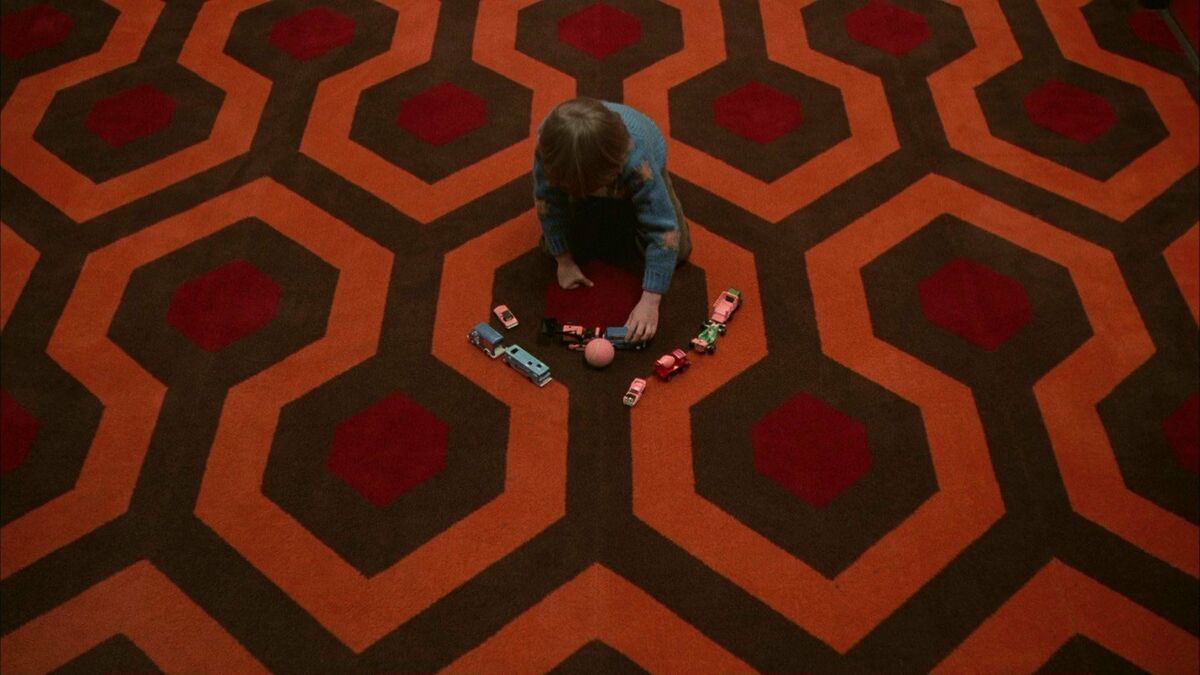
I came into this viewing kind of prepared to be underwhelmed. My recollection of this was of a visually striking film that was pulling in too many directions at once to really land thematically, kind of a collage of vibes and imagery that just swirls around without landing anywhere. But this watch made me feel like there was actually more there than I was giving it credit for.
I think a lot of the sense of disjointedness i inherited from the book. They clearly wanted to keep the title, which means keeping the concept of "shining" and Tony. But it all feels superfluous in the context of the film's orientation around Jack rather than Danny. It's really only relevant in motivating Danny's interactions with Dick Halloran—a character who himself is done pretty dirty, existing only to explain the titular shining, deliver a warning about room 237, bring a means of escape, and then die instantly upon setting foot in the hotel. I can't help but feel that a story less chained to the novel could have restructured all of this into something more interesting.
I do think Kubrick and Johnson made absolutely the right call in the way they framed Jack. The novel's more sympathetic portrayal (driven, reportedly, by King's own identification with the character) would undercut the ability to use the character to address patriarchy and abuse, and instead center the hotel as an ontologically evil place that corrupts indiscriminately. The darker, unsettlingly suave portrayal by Nicholson immediately raises red flags in his interactions with his wife and kids, and sets up a clear implication that his cruelty isn't just the product of either alcohol or the Overlook.
The film is pointedly full of internal contradictions, and one in particular stood out to me. In the initial interview scene, Jack acts as though he has no knowledge at all of the previous murders. But not only does he identify Grady's ghost by sight, he specifically mentions having seen him *in the newspaper*, suggesting he was following the killings at the time and had known about them for years. We can then read his seeking employment at the Overlook as, in essence, a willing first step towards violence. Perhaps the hotel called to him, but he chose to answer that call.
This then helps clarify the rest of the film. Jack Torrance isn't a flawed-but-fundamentally-innocent man being seduced by pure evil, he's a man who before the film ever began had fully bought into the patriarchal system that told him he must be an effortlessly brilliant writer and any roadblocks must be caused by his useless wife (whom we see not only cooking bountiful meals but doing Jack's actual job of maintaining the boilers) and his needy son. The Overlook doesn't corrupt him, it enables him. It provides the same background radiation white men have always experienced, just amplified: an understanding that he's always right, his actions are always justified, and that anything that pushes back against this worldview is an affront that must be destroyed with violence.
The hotel itself has its own interesting background that's simultaneously undersold and reinforced by the "Indian burial ground" cliché. The whole thing is conspicuously decorated in Diné weaving patterns despite the offhand mention that they "had to repel a few Indian attacks as they were building it". The only person of color we see in its walls is Dick Halloran, who the hotel ghosts refer to later on with a racial slur. It's a place of conquest: an imperial stronghold built on the literal bones and decorated with the cultural spoils of a people dominated and subdued. In its heyday, Stuart Ullman tells us, it hosted the presidents who oversaw this terrible empire and the (implicitly European) royalty from whose fetid stock the project of colonialism was born.
We see this heyday with our own eyes, first in Jack's visit to the ghost bar and then in the famous final shot. In most ghost stories, the previous grisly murder is the seed of trauma that blooms into a full-scale haunting, but the roaring 20s loom too large in the Overlook to make it credible that Grady's massacre was the point of origin. Grady himself is subsumed into the party, the endless ghastly New Years celebration of the rich and powerful, to which he is consigned to the role of a mere waiter. In this way, the film cannily links imperialism and patriarchy: the party, dancing on the bones of a conquered people, flouting Prohibition with glasses held high, too powerful to be touched by the laws they impose on the plebians at their feet, is the bloodthirsty engine that drives the caretakers to their violent fates; and it does so by nurturing in them visions of this conquest in miniature, driving these working men to play out the same murderous and domineering triumph in the only space where they have any real power: the family.